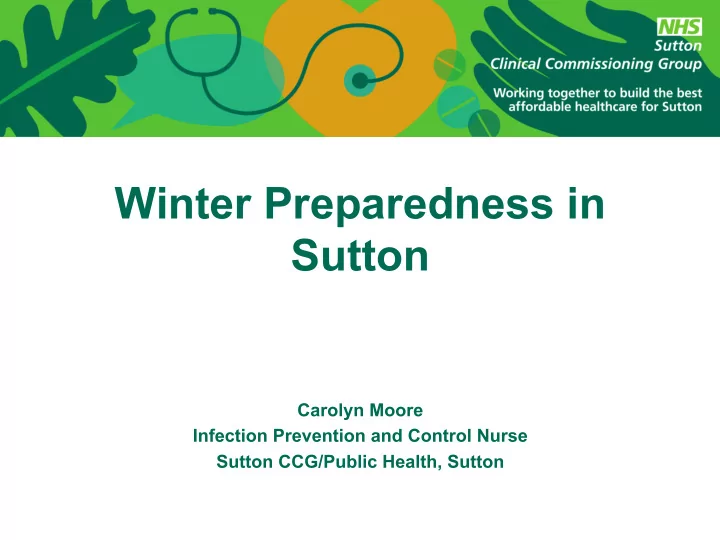

Winter Preparedness in Sutton Carolyn Moore Infection Prevention and Control Nurse Sutton CCG/Public Health, Sutton
Influenza - seasonal • Poses a significant risk to all healthcare providers • Key factor in NHS winter pressures • Often underestimated • Estimated that up to 25% of HCWs contract flu during the season
What is flu? • Flu is an acute viral infection of the respiratory tract (nose, mouth, throat, bronchial tubes and lungs) • Highly infectious illness which spreads rapidly in closed communities • Easily transmitted by large droplets, small-particle aerosols and by hand to mouth/eye contamination from an infected surface or respiratory secretions of infected person • Incubation period 1-5 days (average 2-3 days) though may be longer especially in people with immune deficiency • Even people with mild or no symptoms can infect others
Features of flu Common symptoms include: • Sudden onset of fever, chills, headache, muscle and joint pain • A fever - 38 o C or higher or feeling feverish (not everyone with the flu has a fever) • Extreme fatigue • Dry cough and/or sore throat • A runny or stuffy nose • In young children gastrointestinal symptoms such as vomiting and diarrhoea may be seen
Symptoms of flu
How the flu vaccine works • The injected flu vaccine stimulates the body's immune system to make antibodies which attack the flu virus. • Antibodies are proteins that recognise and fight off germs, such as viruses, that have invaded the blood. • If exposed to the flu virus after the flu vaccine, the immune system will recognise the virus and immediately produce antibodies to fight it. • It may take 10 to 14 days for immunity to build up fully after the flu vaccine.
Flu vaccine effectiveness • Efficacy calculated at between 50-60% for adults aged 18-65yrs, • Lower efficacy in elderly although immunisation shown to reduce incidence of severe disease including bronchopneumonia, hospital admissions and mortality • In 2014/15 the flu vaccine only provided limited protection against infection caused by one particular strain of flu A (H3N2) • Throughout the last decade, there has generally been a good match between the strains of flu in the vaccine and those that subsequently circulated • It is crucial the mismatch in winter 2014/15 does not discourage at- risk groups from having flu vaccination in future flu seasons • Flu vaccination remains the best way to protect people from flu The national flu immunisation programme 2015/16
Health and social care workers • HCWs are more likely to be infected than other members of the general public • Evidence vaccination significantly lowers rates of flu-like illness, hospitalisation and mortality in elderly in long-term healthcare settings • Reduces transmission of flu to vulnerable patients, some of whom may have impaired immunity that may not respond well to immunisation • Vaccination of frontline workers also helps reduce sickness absences and contributes to keeping the NHS and care services running through winter pressures
Barriers to flu vaccine uptake in HCWs • Most common reason is that HCWs do not believe that they need the vaccine – personal protection • Concerns about adverse reactions • Concerns about vaccine efficacy • Lack of access
Mythbusters • The flu vaccine gave me the flu! • I never get the flu so I do not need to have the vaccine • The flu vaccine is not safe • The vaccine does not work • I do not need to have the vaccine every year • I have had the flu already this year so I don’t need the vaccine • The flu vaccine cannot protect me against swine flu • I missed the jab before December so it is not worth having it now
Key messages • Much greater focus on preventing transmission • Annual vaccination of health and social care workers (Duty of care)is the most effective method. It protects them & reduces risk of spreading flu to their patients, service users, colleagues and family members • The code of practice on the prevention and control of infections and related guidance reminds you of your responsibilities. • Employers should make vaccines available free of charge to employees if a risk assessment indicates that they are needed 11
Take back messages for your staff • Duty of care as professionals to your residents to do everything in their power to protect them against infection, including being immunised against flu • Getting vaccinated against flu can help protect them, their patients and family • Everyone is susceptible to flu, even if you are in good health and eat well • They can be infected with the virus and have no symptoms but can still pass flu virus to others including patients or residents • Good infection control measures reduce spread of flu and other acute respiratory infections in healthcare settings but are not sufficient alone to prevent them • Impact of flu on frail and vulnerable patients can be fatal and outbreaks can cause severe disruption in communities, care homes and hospitals • Flu vaccine has a good safety record and will provide protection. • The flu vaccine CANNOT give you flu.
Pregnant women • All pregnant women are recommended to receive the inactivated flu vaccine irrespective of their stage of pregnancy • Pregnant women are at increased risk from complications if they contract flu • Having flu during pregnancy may be associated with premature birth and smaller birth size and weight • Flu vaccination during pregnancy provides passive immunity against flu to infants in the first few months of life • Studies on safety of flu vaccine in pregnancy show that inactivated flu vaccine can be safely and effectively administered during any trimester of pregnancy • No study to date has demonstrated an increased risk of either maternal complications or adverse foetal outcomes associated with inactivated flu vaccine • Women should be offered the vaccine every time they are pregnant
Recommend
More recommend